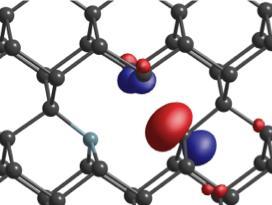 First-principles studies of the effect of (001) surface terminations on the electronic properties of the negatively charged nitrogen-vacancy defect in diamond
First-principles studies of the effect of (001) surface terminations on the electronic properties of the negatively charged nitrogen-vacancy defect in diamond
Density functional calculations have been carried out on (001)-orientated slabs of diamond with different surface terminations. A negatively charged nitrogen-vacancy defect (NV−) is placed in the middle of the slab approximately 1 nm from each surface and the effect of the surface on the internal optical transition in NV− investigated. The calculations show that the chemical nature of the surface is important. We find that although the clean surface does not lead to charge transfer between the defect and the surface, there is a splitting of the empty excited state, the final state in optical absorption, arising from a strong hybridization of the surface and defect bands. This leads to a broadening of the 1.945 eV transition of the NV− defect. OH- and F-terminated surfaces have no surface states in the band gap and again charge transfer between the defect and surface does not occur. The splitting of the e levels responsible for the optical transitions for OH or F termination is similar to that found in periodic boundary condition simulations for bulk diamond where the defects are separated by 1 nm, and thus the calculations show that hydroxylated or fluorinated surfaces give favorable optical properties.
Go back